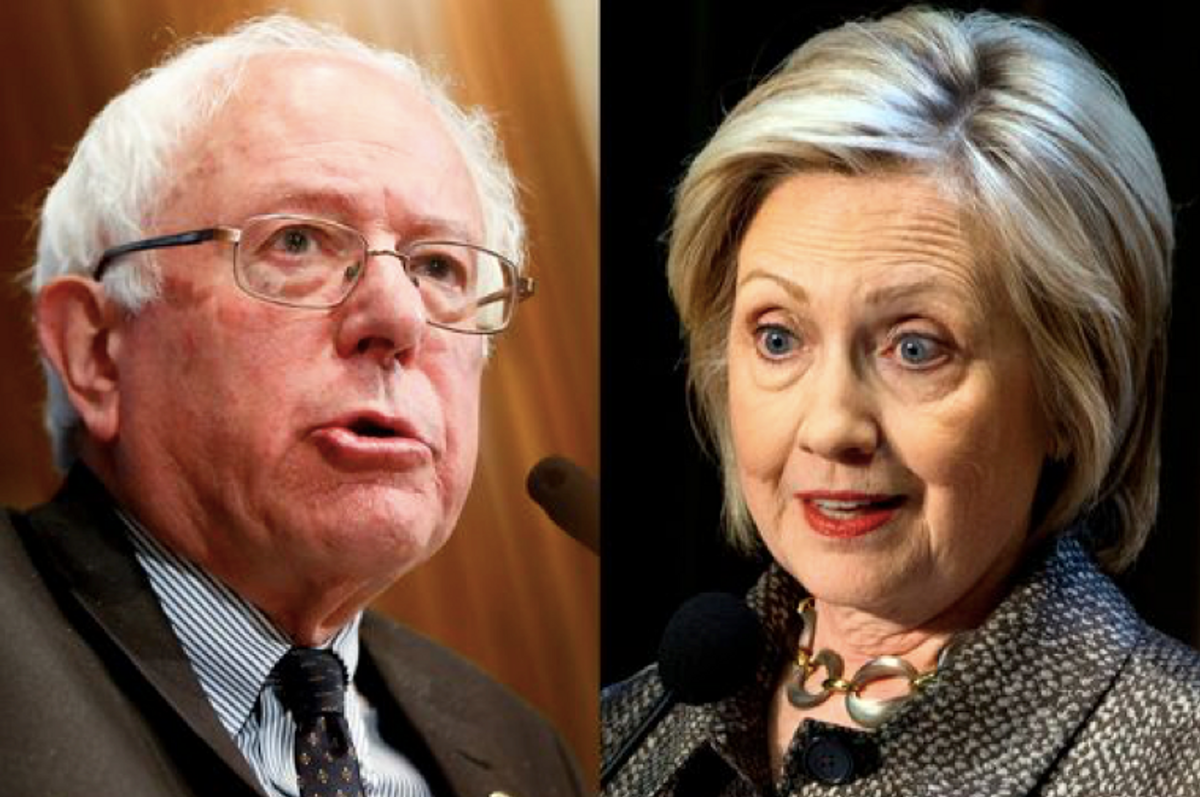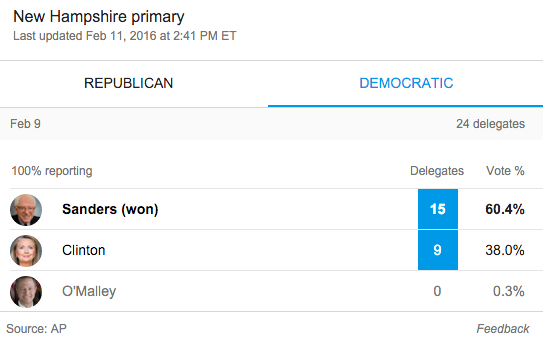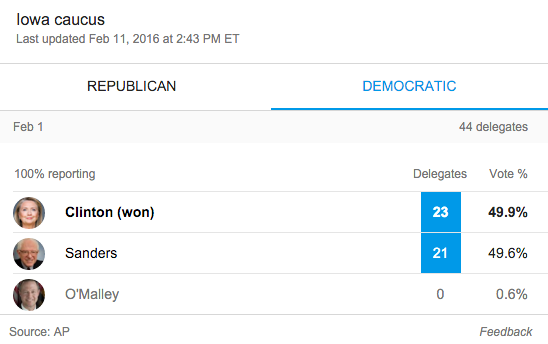On 9 February 2016, New Hampshire's "first in the nation" primary election captivated voters. At the end of the night's tallies, Senator Bernie Sanders walked away with 60 percent of votes to Hillary Clinton's 38 percent:
The win followed a razor-thin margin after Iowa's caucuses. Clinton edged out three-tenths of a percentage point over Sanders in the 1 February 2016 contest:
Not long after Sanders supporters began a post-New Hampshire victory lap, rumblings began about "superdelegates," and whether Sanders' lead in the Granite State amounted to as much as it appeared to on first glance.
On 10 February 2016, USUncut published an article speculating that Sanders' win could be nullified by state superdelegates empowered with the discretion to pledge support to a candidate, no matter what the outcome of the primary might be:
Bernie Sanders took 60% of the popular vote among the Democratic race on Tuesday, but because of the delegate process, Bernie Sanders will leave with a minimum of 13 delegates, but very likely 15. At the same time, challenger Hillary Clinton (who lost by more than a 20-point margin among the electorate) also walks aways with 15 ... New Hampshire has 24 “pledged” delegates determined by the vote, of which Sanders won 13 and Clinton won 9. However, the state also put forward 8 “superdelegates,” who are insiders in the state’s Democratic party who are free to vote how they choose. Six of these are already pledged to Clinton, with the other two remaining undecided, meaning Sanders can only (at best) tie with Clinton, despite his commanding lead.
In the national race, Clinton already has 394 delegates out of a total of 4,763, compared to only 42 for Bernie Sanders. Of those pledged to Clinton, 360 are superdelegates, whereas Sanders has only picked up 8 in this category. 2,382 total delegates are needed to win the party’s nomination.
Although the article initially suggested that the superdelegates were essentially a done deal, it concluded by noting that those party operatives weren't obliged to support Clinton further down the line should popular votes favor Sanders:
The silver lining to all this is that the superdelegates’ pledge to Clinton is not finalized, and each one can still change their vote prior to the final vote following the last state primaries. Typically, superdelegates vote in line with the popular vote when the time comes, but there is nothing requiring them to do so.
Sign this petition created at MoveOn.org to call out the superdelegates and urge them to change their vote in line with the people’s choice.
Politico offered a more nuanced take. Estimating a tentative delegate count of 394 for Clinton to 44 for Sanders, the outlet reported on the efforts of progressive public policy advocacy group MoveOn.org (which has endorsed Sanders) to "stand with voters and honor the outcomes of primaries and caucuses" for the 2016 Democratic National Convention:
In an apparent effort to blunt that momentum, MoveOn.Org Political Action — which has endorsed the Vermont senator — issued a petition Wednesday night calling on Democratic superdelegates to pledge to back who the voters and caucus-goers have selected in their states during the Democratic National Convention this summer.
“We will not allow Democratic Party insiders to determine the outcome of this election. Democratic voters will decide the party’s nominee,” Ilya Sheyman, who is the executive director, said in a statement. “There is of course no problem with superdelegates choosing to endorse whichever candidate they prefer, but when it comes time to select the party’s nominee at the Democratic Convention, superdelegates must stand with voters and honor the outcomes of primaries and caucuses held across the country. The party’s base simply will not tolerate any anti-democratic efforts by superdelegates to thwart the will of the people.”
Vice was more skeptical of the spectre of superdelegates. Describing headline estimates of a delegate wash as "misleading at best" (and the MoveOn.org petition as "understandable, but ridiculous"), it said that the inclusion of superdelegates was somewhat premature:
Sanders won 15 delegates in New Hampshire, while Clinton took nine. And he actually leads Clinton overall in pledged delegates as well, with 36 to her 32. What that Google search and some news outlets are including are superdelegates, the group of elected Democrats and party officials that are cast as shadowy characters every four years because of specious tallies like these.
The regular delegates that the candidates have earned so far must vote at the convention as their states did: 36 will back Sanders, 32 will back Clinton. The superdelegates can vote for whomever they want, regardless of the results of the elections that have taken place so far.
And it's true that of 712 superdelegates that will cast their votes at the Democratic National Convention in 2016, 362 of them have already said that they support Clinton, according to an Associated Press analysis. Sanders has eight.
Vice pointed out that while superdelegates pledged initial support to Clinton's campaign, there was no reason to expect they'd remain steadfast should the primaries swing more in Sanders' favor:
These superdelegates have said that they support Clinton's campaign, not that they will vote to nominate her at a convention five months away in the face of hypothetically massive support for Sanders when all of the primaries and caucuses are over. These are mayors and senators and governors and party leaders, not morons. Voting to nominate Clinton if Sanders enters the convention with a big lead among regular delegates would handicap her as the party's nominee, as would the opposite. Democrats want voters to show up in the general election and vote for whomever they have nominated. Going over their heads to back a candidate who has lost the support of a majority of voters is not the way to do that.
Josh Putnam of the political science blog FrontloadingHQ addressed a Twitter rumor about New Hampshire delegate distribution skewing due to superdelegates, and opined Sanders position was neither cemented nor diminished by those allocations:
@twall_e No. Clinton's supers draw her even with Sanders' total from last night. Still 2 other undecided NH superdelegates.
— Josh Putnam (@FHQ) February 10, 2016
On the Democratic side, if things hold, Sanders will end up +6 in NH, neutralizing Clinton's +6 superdelegate advantage there. — Josh Putnam (@FHQ) February 10, 2016
NPR referenced Putnam's prior superdelegate explainers in their own analysis:
This is what makes Clinton so powerful in the Democratic race — even while she and Sanders battle it out among rank-and-file voters, she has a massive lead among superdelegates. Altogether, she already has 394 delegates and superdelegates to Sanders' 44 — a nearly ninefold lead. And as NPR reported last year, a Democratic candidate needs 2,382 total delegates (super or not) to win the nomination. Of those, 712 are superdelegates ... [A superdelegate] gives the party some space to overrule primary and caucus voters. The goal wasn't to shut voters out, Putnam adds. Rather, the Democratic Party wanted to make sure it nominated someone the party believed could win in a general election, as the party feared primary voters might choose a candidate that's too extreme.
Putnam's subsequent assessment was similar to that of FiveThirtyEight's Nate Silver, who reminded readers that superdelegates aren't conscripted to back any specific candidate (and are unlikely to disregard voter leanings en masse):
Not a big fan of lumping delegates and superdelegates together. Super Ds can switch and some will if it looks like Bernie has a mandate. — Nate Silver (@NateSilver538) February 10, 2016
Finally, Paste placed the fear of superdelegates in a more detailed context, explaining (in an overt opinion piece holding that the narrative was a tactic to scare voters off voting for Sanders) why their influence was unlikely to override popular votes:
Here’s why it doesn’t matter: Superdelegates have never decided a Democratic nomination. It would be insane, even by the corrupt standards of the Democratic National Committee, if a small group of party elites went against the will of the people to choose the presidential nominee.
This has already been an incredibly tense election, and Sanders voters are already expressing their unwillingness to vote for Clinton in the general election. When you look at the astounding numbers from Iowa and New Hampshire, where more than 80 percent of young voters have chosen Sanders over Clinton, regardless of gender, it’s clear that Clinton already finds herself in a very tenuous position for the general election. It will be tough to motivate young supporters, but any hint that Bernie was screwed by the establishment will result in total abandonment.
Democrats win when turnout is high, and if the DNC decides to go against the will of the people and force Clinton down the electorate’s throat, they’d be committing political suicide.
The important thing to know here is that Superdelegates are merely pledged to a candidate. We know who they support because they've stated it publicly, or have been asked by journalists. They are not committed, and can change at any time. If Bernie Sanders wins the popular vote, he will be the nominee. End of story.
It's true that Hillary Clinton's campaign appears to have several times more pledged superdelegates than Sanders', and that superdelegates are allocated independent of state primaries, but most credible prognostications maintain that superdelegates are highly unlikely to buck primary trends as results filter in by state. Additionally, ignoring those outcomes is in no way beneficial for the party they represent. So while it might be accurate to say Clinton currently maintains several times more pledged superdelegates than Sanders, there is no reason to expect those pledges to hold should more primaries favor Sanders over Clinton.


